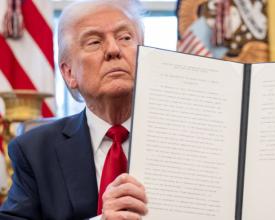DHA eNews – China Hits U.S. Hardwoods With 125% Tariff
Keeping up with changes to U.S. trade policy has been challenging over the last couple of months. The bottom line is that most reciprocal tariffs have been paused, leaving rates generally at 10%, except for China. In addition, USMCA-compliant products are still exempt. There is a good summary from the Wiley law firm below. Attorney Tim Brightbill of Wiley will join us at the DHA annual meeting to discuss trade policy and its impacts on our industry. I look forward to seeing you there.
In addition to trade policy, the Trump administration is shaking up regulatory policy. On April 9, President Trump directed agencies to repeal unlawful regulations quickly. This action, plus the many Supreme Court rulings over the last several years that have pushed back on regulatory agencies, could lead to much faster repeal of regulations than in the past. Previously, changes required new rulemaking, which is a slow process.
If you have questions or comments, contact me. I look forward to hearing from you.

Keith A. Christman, President

On April 9, President Trump signed an executive order that increased the reciprocal tariff on Chinese products to 125% and substantially increased entry fees on low-value shipments from China. The order paused high reciprocal tariffs on many other countries, leaving those countries with a 10% tariff rate through July 9. Goods from Canada and Mexico covered under the 2020 U.S.-Mexico-Canada free trade agreement are exempt from tariffs.
On April 9, President Trump signed a memorandum directing agencies to prioritize the repeal of regulations believed to be unlawful under ten recent U.S. Supreme Court cases "without notice and comment." The expected result is that many regulations are likely to be repealed quickly.
On April 11, China matched the U.S.'s increased tariff with a 125% rate on U.S. products, including hardwoods. This applies to goods shipped after April 10 that arrive in China after May 13. Per the Chinese government, "at the current tariff level, there is no market acceptance for U.S. goods exported to China."
The U.S. Department of Agriculture directed the U.S. Forest Service to increase timber outputs, simplify permitting processes, remove National Environmental Policy Act processes, reduce implementation and contracting burdens, and to work directly with state and local government and forest product manufacturers to ensure that the Forest Service delivers a reliable and consistent supply of timber.
The bipartisan Jobs In The Woods Act will create a competitive grant program that provides funding for job training in forestry operations and forestry products industries.
Last week, lawmakers reintroduced the bipartisan White Oak Resilience Act. The law would empower the Department of the Interior and the U.S. Forest Service to lead white oak restoration projects and establish the White Oak Restoration Fund to support public-private partnerships focused on the regeneration, reforestation, and long-term sustainability of white oak.
Last year, Vietnam exported more than $9 billion of wood products to the U.S., about 40% of all U.S. wood products imports. Wood products are a top contributor to Vietnam's trade surplus. In contrast, Vietnam imports only about $323 million of U.S. timber each year, $300 million of which is in raw materials like oak and ash. These are processed into finished goods and re-exported, often back to the U.S.
The latest article by DHA President Keith Christman talks about balancing technology and nature. From using AI to improve the manufacturing of decorative hardwood products, to the importance of the hardwood industry, to the restorative qualities of hardwoods in our workplaces and homes, DHA continues to promote the benefits of North American hardwoods.
DHA member les boisés La Fleur recently commented on the challenges facing veneer manufacturers in Canada. After U.S. threats of tariffs and subsequent pauses, ironically, the only tariffs on the U.S.-Canadian wood products trade were imposed by Canada. "We look a little stupid," said the Québec manufacturer who is paying for Canada's counter-tariffs.
"We are a vertically integrated enterprise, from manufacturing to logistics to retail. When other furniture companies moved their manufacturing overseas, we chose to stay in North America and today make about 75% of our furniture in these workshops," said the head of Ethan Allen.
As efforts to downsize and reorganize the federal government move forward, state foresters have raised concerns that decisions affecting the U.S. Forest Service could unintentionally hinder the prosperity of forested communities and heighten wildfire risks for communities across the country.
Colorado State University and the Colorado State Forest Service have begun the construction of a new tree nursery that will help produce millions of new trees each year to help the state and the country recover from wildfires. The new facility in Fort Collins will replace a nursery that has been in operation for decades.
Every year, Missouri's George O. White State Forest Nursery ships two million tree seedlings to customers in the state and across the country. The nursery was founded by the U.S. Forest Service in the 1930s to assist landowners in reforesting the state, as the Ozarks were heavily logged during the construction of railroads.
The Louisville Slugger, the iconic bat used by players from the big leagues down to little league, is made out of what kind of wood?





